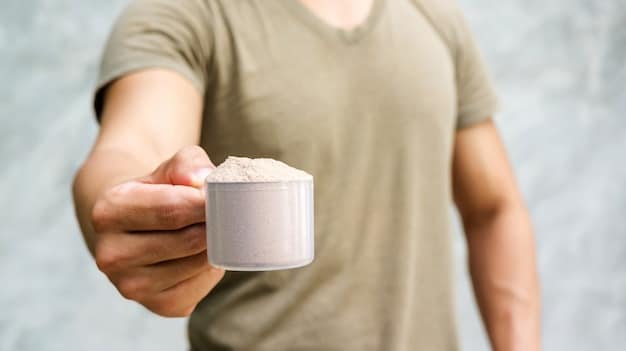Latest Protein Intake Recommendations for Muscle Growth in 2025

The latest recommendations for protein intake to support muscle growth emphasize a range of 1.6 to 2.2 grams of protein per kilogram of body weight per day, prioritizing high-quality protein sources and strategic timing around workouts to optimize muscle protein synthesis.
Are you looking to optimize your muscle growth with the most up-to-date information? Understanding the latest recommendations for protein intake to support muscle growth is crucial for achieving your fitness goals efficiently and effectively.
Understanding the Basics of Protein and Muscle Growth
Protein is fundamental to muscle growth because it provides the amino acids necessary to repair and build muscle tissue. Without adequate protein, your body can’t effectively recover from workouts and build new muscle mass. Let’s explore the core concepts.
Why Protein Matters for Muscle Building
Protein is the building block of muscle tissue. When you engage in resistance training, you create micro-tears in your muscle fibers. Protein helps repair these tears, leading to muscle growth and increased strength.
The Role of Amino Acids
Amino acids, which are derived from protein, are essential for muscle protein synthesis (MPS), the process of repairing and building muscle. Essential amino acids, in particular, must be obtained from your diet as your body cannot produce them.

For optimal muscle growth, consider the following:
- Complete Proteins: Choose complete protein sources like meat, dairy, eggs, and soy, which contain all essential amino acids.
- Timing: Consume protein at regular intervals throughout the day, especially after workouts, to maximize MPS.
- Variety: Include a variety of protein sources in your diet to ensure a broad range of amino acids and nutrients.
In summary, understanding the basics of protein and its components, such as amino acids, is crucial for anyone looking to maximize muscle growth. Prioritizing protein intake and choosing high-quality sources will contribute to achieving your fitness goals.
Current Protein Intake Recommendations
The general recommendation for protein intake has evolved, with research suggesting that active individuals may require more than the standard guidelines. Here’s a breakdown of the current recommendations for those looking to build muscle.
General Guidelines vs. Athlete Needs
While the Recommended Dietary Allowance (RDA) for protein is 0.8 grams per kilogram of body weight, this guideline is primarily for sedentary individuals. Athletes and those engaging in regular resistance training need considerably more.
Optimal Intake for Muscle Growth
Research indicates that an optimal protein intake for muscle growth falls within the range of 1.6 to 2.2 grams of protein per kilogram of body weight per day. This range ensures adequate amino acids are available for muscle repair and growth.
Key considerations for protein intake include:
- Individual Variation: Factors such as age, sex, training intensity, and overall calorie intake can influence protein needs.
- Protein Quality: Prioritize high-quality protein sources that are easily digestible and contain all essential amino acids.
- Distribution: Spread your protein intake throughout the day to maintain a consistent supply of amino acids for muscle protein synthesis.
To conclude, current recommendations suggest that a higher protein intake, ranging from 1.6 to 2.2 grams per kilogram of body weight, is beneficial for those looking to build muscle. This intake should be adjusted based on individual factors and complemented with high-quality protein sources.
High-Quality Protein Sources
Not all protein sources are created equal. High-quality proteins contain all essential amino acids and are easily digestible, making them ideal for supporting muscle growth. Let’s dive into some of the best options.
Animal-Based Protein
Animal-based proteins are complete proteins, meaning they contain all nine essential amino acids. They are also highly bioavailable, making them an excellent choice for athletes and bodybuilders.
Plant-Based Protein
Plant-based proteins can also be effective for muscle growth, although they may require a bit more planning. Many plant-based sources are incomplete proteins, meaning they lack one or more essential amino acids.

Here are some examples of high-quality protein sources:
- Chicken Breast: Lean, versatile, and packed with protein.
- Eggs: An excellent source of protein and essential nutrients.
- Greek Yogurt: High in protein and beneficial for gut health.
- Tofu: A versatile plant-based protein source that can be used in a variety of dishes.
In summary, high-quality protein sources are essential for maximizing muscle growth. Whether you choose animal-based or plant-based options, ensure you are consuming complete proteins and getting a variety of nutrients to support your fitness goals.
The Importance of Protein Timing
When you consume protein can be just as important as how much you consume. Strategic protein timing can help optimize muscle protein synthesis and improve recovery. Let’s explore the best times to consume protein.
Pre-Workout Protein
Consuming protein before a workout can help supply your muscles with amino acids during exercise, potentially reducing muscle breakdown and enhancing performance.
Post-Workout Protein
The post-workout period is crucial for muscle recovery and growth. Consuming protein within a few hours after exercise can help stimulate muscle protein synthesis and replenish glycogen stores.
Optimal protein timing strategies include:
- Breakfast: Start your day with a protein-rich breakfast to kickstart muscle protein synthesis.
- Between Meals: Consume protein between meals to maintain a steady supply of amino acids throughout the day.
- Before Bed: Eating protein before bed can help support overnight muscle recovery and growth.
In conclusion, protein timing plays a significant role in maximizing muscle growth and recovery. Consuming protein before and after workouts, as well as throughout the day, can help optimize muscle protein synthesis and support your fitness goals.
Protein Supplements: Are They Necessary?
Protein supplements can be a convenient way to increase your protein intake, but are they necessary for muscle growth? Let’s examine the pros and cons of using protein supplements.
Whey Protein
Whey protein is a popular supplement derived from milk. It is quickly digested and absorbed, making it an excellent choice for post-workout recovery.
Casein Protein
Casein protein is another milk-derived protein that is digested more slowly than whey. It is often consumed before bed to provide a sustained release of amino acids overnight.
Important factors to consider when using protein supplements:
- Convenience: Supplements offer a convenient way to meet your protein needs, especially when you have limited time or access to whole foods.
- Quality: Choose high-quality supplements from reputable brands to ensure you are getting a product that is safe and effective.
- Whole Foods First: Prioritize whole food sources of protein whenever possible, as they provide additional nutrients and benefits.
In summary, protein supplements can be a useful tool for increasing protein intake and supporting muscle growth. However, they are not a necessity, and whole food sources should always be prioritized.
Practical Tips for Meeting Your Protein Needs
Meeting your daily protein needs can be challenging, but with a few strategic adjustments to your diet, it’s achievable. Here are some practical tips to help you reach your protein goals efficiently.
Meal Planning
Planning your meals in advance can help you ensure you’re getting enough protein throughout the day. Focus on including protein-rich foods in each meal.
Snacking Smart
Choose protein-rich snacks to help bridge the gap between meals and keep you feeling full and satisfied. Examples include Greek yogurt, nuts, seeds, and hard-boiled eggs.
Easy strategies to incorporate more protein into your diet:
- Add Protein to Every Meal: Include a source of protein in every meal, such as eggs for breakfast, chicken for lunch, and fish for dinner.
- Use Protein-Rich Toppings: Sprinkle nuts, seeds, or cheese on salads and other dishes to boost their protein content.
- Prepare Protein in Advance: Cook protein-rich foods like chicken breast or hard-boiled eggs in advance so they are ready to eat when you need them.
To summarize, meeting your protein needs is achievable with strategic meal planning, smart snacking, and incorporating protein into every meal. By making small adjustments to your diet, you can ensure you’re getting enough protein to support muscle growth and overall health.
| Key Point | Brief Description |
|---|---|
| 💪 Protein Intake | Aim for 1.6-2.2g of protein per kg of body weight daily. |
| 🍳 Protein Sources | Prioritize high-quality sources like eggs, chicken, and Greek yogurt. |
| ⏰ Protein Timing | Consume protein before and after workouts. |
| 💊 Supplements | Consider whey protein for convenience, but prioritize whole foods. |
Frequently Asked Questions
▼
For optimal muscle growth, aim to consume 1.6 to 2.2 grams of protein per kilogram of body weight each day. Adjust based on your activity level and individual needs.
▼
Excellent sources include lean meats like chicken and fish, eggs, dairy products like Greek yogurt, and plant-based options like tofu and lentils. Aim for a balanced variety.
▼
Spreading your protein intake throughout the day is generally more effective. This allows for consistent muscle protein synthesis, rather than one large spike.
▼
Protein supplements are not strictly necessary, but they can be a convenient way to supplement your diet if you struggle to get enough protein from whole foods alone.
▼
Aim to consume protein within a few hours after your workout to maximize muscle recovery and growth. A post-workout protein shake or meal is a good option.
Conclusion
Understanding and implementing the latest recommendations for protein intake to support muscle growth can significantly enhance your fitness journey. By focusing on optimal protein intake, high-quality sources, strategic timing, and personalized adjustments, you can maximize muscle protein synthesis and achieve your desired results.





